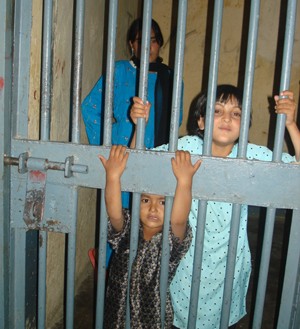KABUL - Fatima (not her real name) lives with her mother and a younger brother in Pul-e Charkhi prison, in the eastern outskirts of Kabul.

The number of children staying with their mothers in Afghan prisons is extremely high, almost equal to the number of their mothers, according to UNODC. (IRIN Photo)
The 12-year-old was first brought to the prison four years ago, after a court sentenced her mother to 11 years for murdering her husband.
"There are six women and seven children living with us in a single cell," complained Fatima, who added that she finds it annoying living with "those naughty kids".
Unlike other children in Kabul, both Fatima and her brother are deprived of an education, because there is no school in Pul-e Charkhi prison, Afghanistan's biggest jail.
"I dream of being able to go to school just like other girls," she said.
Fatima's education prospects are grim. In the absence of a male guardian outside the prison, both children are likely to stay with their mother until she is released in 2014. It is unusual for a young woman to live alone in traditional Afghani society.
According to Afghanistan's criminal code, children who stay with an imprisoned guardian must have access to education.
In practice, however, the country cannot implement this legal provision due to the shortage of resources, officials acknowledge.
Over 60 children are currently living with female prisoners in Pul-e Charkhi prison, the Ministry of Justice (MoJ), which runs prisons in the country, told IRIN.
Health, nutrition, education
Children who live with their parents in prisons are currently entitled to a single food regime available for all prisoners. MoJ officials say a three-meals-a-day routine is in place in Pul-e Charkhi jail which provides sufficient nutrition for an adult.
However, according to a report published in August by the UN Office on Drugs and Crime (UNODC), the prison food regime does not meet the nutritional requirements for children's physical and mental growth.
The report entitled Afghanistan: Female Prisoners and Their Social Integration highlighted problems of pregnant women who, in addition to nutritional deficiencies, also suffered from lack of health care.
"They [imprisoned women and their children] can receive no specialist health care or education, due to acute resource problems," said the report.
To mitigate the hardship for the incarcerated children a local non-governmental organisation (NGO), the Afghan Women's Education Centre (AWEC), has set up a kindergarten in Pul-e Charkhi prison where children receive preschool training to build their cognitive skills.
AWEC also provides basic health services for pregnant women and children suffering minor illnesses.
The NGO’s services could not be relied upon indefinitely as it was dependent on donor funds, observers said.
Psychological impact
NGOs working in Pul-e Charkhi prison who prefer anonymity due to the sensitivity of their work, say almost all children have been affected psychologically by the prison environment.
"They [children] do not concentrate in the kindergarten and show clear signs of obsession," said one aid worker who works with prison children.
The UNODC findings confirm the existence of a number of issues stemming from the prison's environment which are considered unsuitable for the upbringing of children, particularly their health, social, educational and emotional development.
"Research has also indicated that the children of imprisoned mothers may be at greater risk of future incarceration themselves," the report said.
More resources needed
Afghanistan requires ample resources, institutional and legal reforms and generous international assistance to end the deprivation and suffering of children in prisons.
NGOs such as AWEC are advocating that legal measures be adopted which ban the imprisonment of pregnant women until at least six months after delivery, unless an extremely serious crime has been committed.
Others call on the international donor community to help the Afghan authorities construct schools, nurseries and other facilities adjacent to Pul-e Charkhi and other big prisons around the country.



